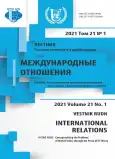“The World is Bigger than Five”. Turkey’s Emergence as a Global Actor in World Politics: Prospects and Challenges for Russia
- Autores: Irkhin A.A.1, Moskalenko O.A.1
-
Afiliações:
- Sevastopol State University
- Edição: Volume 21, Nº 1 (2021): Conceptualizing the Problems of World Politics through the Prism of IR Theory
- Páginas: 91-107
- Seção: THEMATIC DOSSIER
- URL: https://journal-vniispk.ru/2313-0660/article/view/320332
- DOI: https://doi.org/10.22363/2313-0660-2021-21-1-91-107
- ID: 320332
Citar
Texto integral
Resumo
The foreign policy realized by Turkey’s president clearly evidences the fact that Erdogan does not accept today’s world order as a model for the near future. This has led to the proposition of The World Is Bigger than Five formula since 2013. At least in several key regions, Ankara attempts to change the world order through more than emotional declarations; it uses both hard and soft power in the Eastern Mediterranean, Middle East, Black Sea region, Caucasus, and Central Asia. The main indicators of Turkish soft and hard power (military, economic, technological factors, and attractiveness of mass culture) are examined to identify possibilities of Turkey to change the balance of power in key regions and on a global scale. From 2007, the vision of Turkey as an influential actor globally has been propagated by the Turkish elite of the Justice and Development Party (AKP). Geopolitical, civilizational, and systematic approaches are used. The research process is carried out within the paradigm of classical and critical geopolitics. During the AKP’s time in power, moderate Islamists gave Turkey a new impetus - a return to its civilizational roots. One must note the state’s development of its economy, military-industrial complex, and the new national position globally as a patron of every Muslim. Modern Turkey can be considered a great regional power with sectoral global leadership in its military attainment, and due to the attractiveness of its model of development. Ankara invests heavily in soft power, its success is based on the Turkish development ideology, which represents a synthesis of neo-Ottoman, neo-Pan-Turkic and pan-Islamic ideas. The revival of Turkey as a regional power and its desire to become a world power will inevitably increase the space of contradictions in Russian-Turkish relations, reducing the sphere of cooperation between the two countries.
Sobre autores
Aleksandr Irkhin
Sevastopol State University
Autor responsável pela correspondência
Email: alex.irhin@mail.ru
PhD, Dr. of Sc. (Political Science), Head, Political Science and Philosophy Department, Institute of Social Sciences and International Relations
Sevastopol, Russian FederationOlga Moskalenko
Sevastopol State University
Email: kerulen@bk.ru
PhD in Philology, Associate Professor, Theory and Practice of Translation Department, Institute of Social Sciences and International Relations
Sevastopol, Russian FederationBibliografia
- Akıllı, E., & Çelenk, B. (2019). TİKA’s Soft Power: Nation Branding in Turkish Foreign Policy. Insight Turkey, 21(3), 135—151. doi: 10.25253/99.2018EV.05
- Aliriza, B., & Aras, B. (2012). U.S.-Turkish Relations: A Review at the Beginning of the Third Decade of the Post-Cold War Era. CSIS Report, 1—22.
- Avatkov, V.A. (2019). Ideology and Values in Turkey’s Foreign Policy. MGIMO Review of International Relations, 12(4), 113—129. (In Russian). doi: 10.24833/2071-8160-2019-4-67-113-129
- Flanagan, S., Larrabee, S., Binnendijk, A., Costello, K., Efron, S. et al. (2020). Turkey’s Nationalist Course: Implications for the U.S.-Turkish Strategic Partnership and the U.S. Army. Santa Monica, CA: RAND Corporation.
- Gür, N., Tatliyer, M., & Dİlek, Ş. (2019). The Turkish Economy at the Crossroads: The Political Economy of the 2018 Financial Turbulence. Insight Turkey, 21(4), 135—160. doi: 10.25253/99.2019214.08
- Huntington, S. (2016). The Clash of Civilizations. Moscow: AST publ. (In Russian).
- Irkhin, A., Moskalenko, O., Nelina, L., Beloglazov, R., & Demeshko, N. (2021). Building a New World Order: Russia and the Competition of Civilizational Projects. European Proceedings of Social and Behavioural Sciences EpSBS. Vol. 102. International Scientific Forum “National Interest, National Identity and National Security”. 10—12 March (in press).
- Irkhin, A.A. (2016). The USA and Turkey: Strategic Alliance and Tactical Differences. Retrospective and Forecast. Sevastopol: “Ribest” publ. (In Russian).
- Irkhin, A.A. (2019). The External Policy of the Justice and Development Party of Turkey and Geopolitical Interests of Russia. Scientific Notes of V. I. Vernadsky Crimean Federal University. Philosophy. Political science. Culturology, 5(3), 51—62. (In Russian).
- Kennedy, P. (2018). The Rise and Fall of the Great Powers. Yekaterinburg: Gonzo publ. (In Russian).
- Keyman, E.F. (2017). A New Turkish Foreign Policy: Towards Proactive “Moral realism”. Insight Turkey, 19(1), 55—69. URL: https://www.insightturkey.com/fuat-keyman/a-new-turkish-foreign-policy-towards-proactive-moral-realism (accessed: 30.11.2020).
- Khalileva, D.R. (2013). Conflict Potential in Modern Russian-Turkish Relations. Naukovy Vistnik ONEU. Economic, Political and Historical Science, 12(191), 146—169. (In Russian).
- Larrabee, F.S., & Lesser, I.O. (2003). Turkish Foreign Policy in an Age of Uncertainty. Santa Monica, CA: RAND Corporation.
- Larrabee, F.S. (2010). Troubled Partnership: U.S.-Turkish Relations in an Era of Global Geopolitical Change. Santa Monica, CA: RAND Corporation.
- Nadein-Raevskiy, V.A. (2019). Turkey: The Difficult Ally. In V.G. Baranovski & E.G. Soloviev (Eds.), Year of the Planet: Yearbook 2019. Moscow: Idea-Press publ. (pp. 274—286). (In Russian).
- Shpakovskaya, M.A., & Barnashov, O.V. (2018). The Concept of Neo-Ottomanism as an Instrument of “Soft Power” of the Foreign Policy of Turkey. Asia and Africa Today, (2), 30—36. (In Russian).
- Ulchenko, N.Yu., & Shlykov, P.V. (2014). The Dynamics of the Russian-Turkish Relations under Instability. Moscow: Institut vostokovedeniya RAN publ. (In Russian).
- Ulchenko, N.Yu. (2012). Turkey’s New Way? World Economy and International Relations, (6), 90—101. (In Russian).
- Wastnidge, E. (2019). Imperial Grandeur and Selective Memory: Re-assessing Neo-Ottomanism in Turkish Foreign and Domestic Politics. Middle East Critique, 29(1), 7—28. doi: 10.1080/19436149.2018.1549232
Arquivos suplementares









